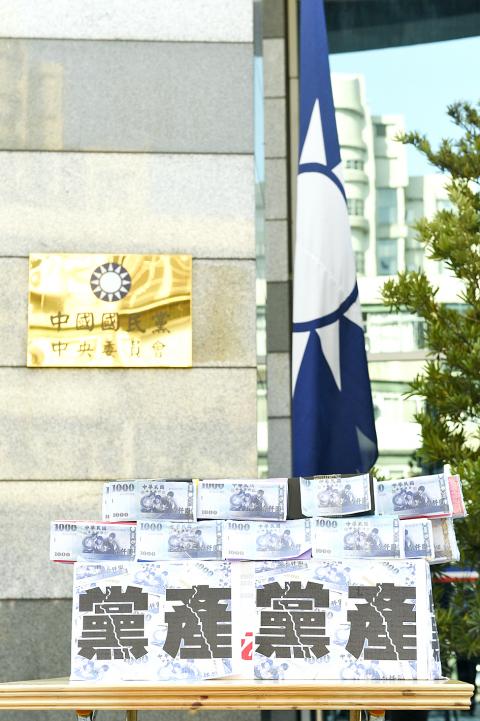The “C1 mark” appended to the Chinese Nationalist Party’s (KMT) assets and its affiliate organizations, which President Ma Ying-jeou’s (馬英九) government had removed nearly seven years ago, is likely to be reinstated after the Legislative Yuan’s Internal Administration Committee on Wednesday last week passed a motion in favor of the move.
In December 2005, the Ministry of the Interior, according to an executive order of the then-Democratic Progressive Party (DPP) administration, instructed land administration units to append the C1 mark to all national assets registered to the KMT and its affiliate organizations.
The intent was to remind corporate owners of the risks they faced when buying allegedly illegal assets the KMT was liquidating.

Photo: George Tsorng, Taipei Times
However, the C1 mark was removed after Ma was elected president in 2008; the Ma administration also closed down Web sites detailing the party’s disputed assets.
All related information was also removed from Web sites such as the National Property Administration.
DPP Legislator Yeh Yi-chin (葉宜津) said that the Ministry of the Interior was on April 3, 2009, informed by the Ministry of Finance to remove all C1 marks, and the interior ministry on April 13 that same year informed local government agencies to remove the C1 marks.
DPP legislators had since attempted to pass a motion in the legislature so that the interior ministry could reinstate the C1 mark on KMT assets, but they had been unable to do so due to the KMT’s majority in the Legislative Yuan.
DPP Legislator Chao Tien-lin (趙天麟) on Wednesday last week made a provisional motion on the matter during a meeting of the legislative committee, which was approved by more than half of the DPP members in the committee.
Launching a general inquiry into the assets alleged to have been illegally seized by the KMT and its affiliate organizations saw popular support, Chao said, adding that the C1 mark must be reinstated to prevent innocent people from buying such property.
“This would prevent further complications between the law and the issue of the party assets,” Chao said.
Chao said that the KMT’s allegedly illegal assets appropriated from national property had been liquidated from NT$6.6 billion (US$202.95 million) to NT$1 billion since the Ma administration’s removal of the C1 mark.
“The C1 mark must be urgently reapplied to all assets that are under the KMT’s name,” Chao said.
The committee had originally asked the interior ministry to reapply the mark immediately, but the ministry said it did not possess files on party assets, Chao said, adding that the committee had instead asked the Ministry of Finance to make known details of the KMT’s assets.

NATIONAL SECURITY THREAT: An official said that Guan Guan’s comments had gone beyond the threshold of free speech, as she advocated for the destruction of the ROC China-born media influencer Guan Guan’s (關關) residency permit has been revoked for repeatedly posting pro-China content that threatens national security, the National Immigration Agency said yesterday. Guan Guan has said many controversial things in her videos posted to Douyin (抖音), including “the red flag will soon be painted all over Taiwan” and “Taiwan is an inseparable part of China,” while expressing hope for expedited “reunification.” The agency received multiple reports alleging that Guan Guan had advocated for armed reunification last year. After investigating, the agency last month issued a notice requiring her to appear and account for her actions. Guan Guan appeared as required,

A strong cold air mass is expected to arrive tonight, bringing a change in weather and a drop in temperature, the Central Weather Administration (CWA) said. The coldest time would be early on Thursday morning, with temperatures in some areas dipping as low as 8°C, it said. Daytime highs yesterday were 22°C to 24°C in northern and eastern Taiwan, and about 25°C to 28°C in the central and southern regions, it said. However, nighttime lows would dip to about 15°C to 16°C in central and northern Taiwan as well as the northeast, and 17°C to 19°C elsewhere, it said. Tropical Storm Nokaen, currently

‘NATO-PLUS’: ‘Our strategic partners in the Indo-Pacific are facing increasing aggression by the Chinese Communist Party,’ US Representative Rob Wittman said The US House of Representatives on Monday released its version of the Consolidated Appropriations Act, which includes US$1.15 billion to support security cooperation with Taiwan. The omnibus act, covering US$1.2 trillion of spending, allocates US$1 billion for the Taiwan Security Cooperation Initiative, as well as US$150 million for the replacement of defense articles and reimbursement of defense services provided to Taiwan. The fund allocations were based on the US National Defense Authorization Act for fiscal 2026 that was passed by the US Congress last month and authorized up to US$1 billion to the US Defense Security Cooperation Agency in support of the

PAPERS, PLEASE: The gang exploited the high value of the passports, selling them at inflated prices to Chinese buyers, who would treat them as ‘invisibility cloaks’ The Yilan District Court has handed four members of a syndicate prison terms ranging from one year and two months to two years and two months for their involvement in a scheme to purchase Taiwanese passports and resell them abroad at a massive markup. A Chinese human smuggling syndicate purchased Taiwanese passports through local criminal networks, exploiting the passports’ visa-free travel privileges to turn a profit of more than 20 times the original price, the court said. Such criminal organizations enable people to impersonate Taiwanese when entering and exiting Taiwan and other countries, undermining social order and the credibility of the nation’s